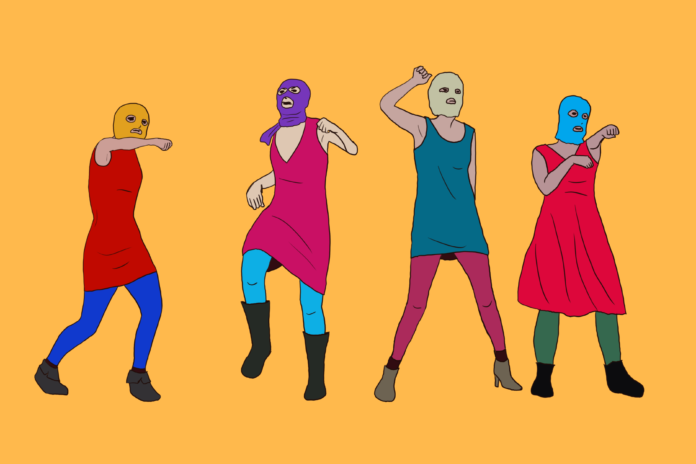Russia’s protest group is telling of its political dissonance
On Feb. 21, 2012, a group of women wearing colorful ski masks and carrying electric guitars stormed the Cathedral of Christ the Saviour in Moscow, Russia. In what they would later call a “punk prayer,” the women jumped around, crying “Mother of God, drive Putin away!” in response to President Vladimir Putin’s recent presidential “re-election.” The three-minute performance of the feminist, punk, protest group, otherwise known as Pussy Riot, not only led to a major prosecution case, but a surge in worldwide activism that left a great impact on modern Russia.
Destroyed by Stalin and rebuilt under the second mayor of Moscow, Yury Luzhkov, the Cathedral of Christ the Saviour is a symbol of Russia’s transforming landscape, both physically and ideologically. While many people condemned Pussy Riot’s stunt as distasteful, given its religious backdrop, the architectural revisions in the church are strangely appropriate for the group’s attitude. Russia’s political identity can be best described as reconstructive, and Pussy Riot is another loose nail that undermines government oppression.
It’s clear that the group’s attack was not just against Putin and his administration, but the entire social and political order he enables. This includes endorsed homophobia, media control and the increasing reunification of church and state.
Following the incident, three members of the group — Nadya Tolokonnikova, Masha Alyokhina and Yekaterina Samutsevich — were arrested and accused of hooliganism. They spent six months in pretrial detention, where they went on a hunger strike that gathered support from Western music stars such as Madonna, The Beastie Boys and the Red Hot Chili Peppers. Hilary Clinton even voiced her support for the group in 2014, calling them “strong and brave women who refuse to let their voices be silenced in Russia.”
All three women were found guilty of “premeditated hooliganism performed by an organized group of people motivated by religious hatred or hostility.” This sentencing led to a new Russian bill in 2013 that introduced imprisonment for “insulting the feelings of the believers.”
Pussy Riot’s stunt, though controversial, was only met with more outrageous policies from the Russian government. In 2016, Russian blogger Ruslan Sokolovsky was arrested and added to an official list of “terrorists and extremists” after posting a YouTube video of him playing Pokémon Go inside a church.
After being released, Tolokonnikova and Alyokhina founded an online news outlet, Mediazona, that covers the corruption of the Russian government. It also focuses on the judicial and correctional systems in Russia, as both women experienced abuse during their time in prison.
“The convicts are always on the verge of breaking down, screaming at each other, fighting over the smallest things,” Tolokonnikova wrote in an open letter. “Just recently, a young woman got stabbed in the head with a pair of scissors because she didn’t turn in a pair of pants on time. Another tried to cut her own stomach open with a hacksaw.”
During the 2014 Sochi Olympics, Pussy Riot attempted to perform their song, “Putin Will Teach You to Love the Motherland,” but they were beaten with belts and pepper sprayed by a Russian paramilitary group known as Cossacks. Cossacks were historically self-governed troops in Russia and Ukraine, and today they can beat anyone with whom they disagree, including peaceful protestors, without repercussion or police intervention.
Since 2016, Pussy Riot has been releasing music revolving around global issues such as feminism, political oppression and inequality. They even released a song titled “Make America Great Again,” in response to Donald Trump’s presidential campaign. The music video features Tolokonnikova dressed as Trump in a dystopian world where he is an abusive president.
I recall seeing individuals dressed in police uniforms dash across the field in the 2018 World Cup final, before being hauled off by security. A little annoyed, I researched what had happened and found out it was a group by the name of Pussy Riot attempting to draw attention to Russia’s human rights abuses. Even after six years, there’s still something to protest.
Although their attention in the media has begun to fade in recent years, their impact on Russia is undeniable. While some view them as insane, others applaud their bravery and use of shock value to promote an awareness toward the problems of modern Russia and its government. As someone who is disheartened by Russia’s current political climate, I find Pussy Riot’s activism more important than ever, and I am glad that they are able to reach wider audiences. It’s easy to forget the injustices that happen in other countries, but the group’s blunt actions certainly don’t go unnoticed.
“The young people who have been flayed by the systematic eradication of freedoms perpetrated through the ‘00s have now risen against the state” said Tolokonnikova in an interview, “We were searching for real sincerity and simplicity, and we found these qualities in the [‘holy foolishness’] of punk.”
Written by: Julietta Bisharyan — jsbisharyan@ucdavis.edu
Disclaimer: The views and opinions expressed by individual columnists belong to the columnists alone and do not necessarily indicate the views and opinions held by The California Aggie




